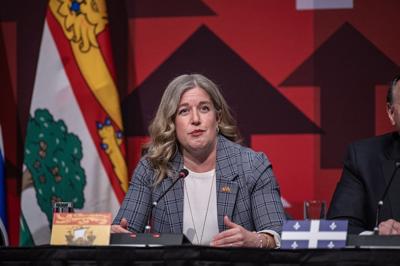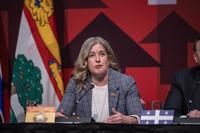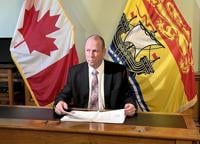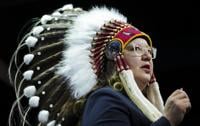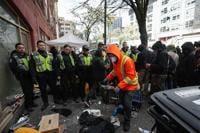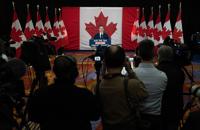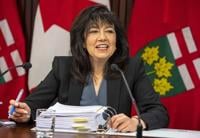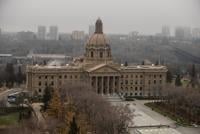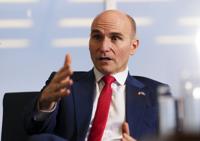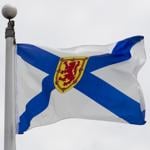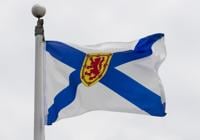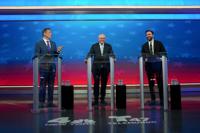FREDERICTON - Money is flowing into the coffers of New Brunswick's three main political parties from people with mailing addresses in the United States, recently released financial reports show.
The end-of-year financial returns by the governing Liberals, the Opposition Progressive Conservatives and Greens show that each has reported receiving tens of thousands of dollars in donations that appear to be coming from other provinces in Canada as well as from across the border.
The report filed by the Progressive Conservatives in June 2025 shows that the party, which was in government until the 2024 election, had the largest pool of donors with U.S. mailing addresses. The Tories reported over $12,000 in donations from people who listed addresses in the United States in the 2023-24 fiscal year. The Greens reported $1,450 in donations from people with U.S. mailing addresses while the Liberals got $250.
The numbers highlight a longstanding issue in the Atlantic province, which allows donations from people who are not eligible to vote in its elections.
While Liberal Premier Susan Holt has promised to change campaign financing rules to ban donations from outside the province, Progressive Conservative Leader Glen Savoie sidestepped questions from ºÚÁϳԹÏÍø about whether he approved of his party raising money outside of Canada.
"What should my opinion be? What are you looking for?" Savoie asked. "Why is that a problem?"
Overall, the party's financial returns also show that the Progressive Conservatives raised more than $260,000 in out-of-province donations while the Liberals received $40,000 and the Greens collected more than $10,000.
Savoie said he doesn't believe the out-of-province funding can influence his party's policies.
"Whether it's a New Brunswicker or whether it's somebody from outside of New Brunswick what difference does it make?" he said.Â
"At the end of the day, it is up to the people who work for our party to filter those things, make sure that they understand where things are coming from and act accordingly. But you know, that's not something that I concern myself with."
The total donations received by the Progressive Conservatives for 2024 was $1,413,482.32, followed by the Liberals at 1,188,482.61, and Greens at $347,638.69.
Provincial election financing rules require the parties to disclose names and addresses of people who donate over $100 every year.
The Progressive Conservatives received $113,201.59 from people who donated $100 or less, while the Liberals received $52,974.11 and Greens collected $37,236.39 from people in this category.
In January 2024, former premier Blaine Higgs was criticized by the Liberals and Greens for province-hopping to raise money for his campaign, with fundraisers held in British Columbia, Alberta and Ontario. He also hosted a reception in Toronto that cost $250 a person, while dinner was $1,000.
Jamie Gillies, a political scientist at St. Thomas University, said parties should think twice before accepting money from U.S. sources due to the optics, at a time when Canada is in the midst of a trade war with the Trump administration.
He also believes the premier should follow through on a commitment to ban the practice.
"If it's a provincial political party, shouldn't the funds that it raises be from donations within the province, by citizens of the province? It starts to become an interesting question about who finances political parties."
At the federal level, only ºÚÁϳԹÏÍø citizens or permanent residents can make contributions to political parties.
Paul Harpelle, spokesman for Elections New Brunswick, said there is no requirement for a person living outside the country to provide a ºÚÁϳԹÏÍø address to make a donation to a political party within the province.
But he said the donation is limited to $3,000, and no trade unions or corporations are allowed to give money.
"We have to see that it is coming from an individual," he said. "If someone has received money from their corporation — we can't trace the source of the funding."
The provinces that allow contributions from outside their jurisdictions other than New Brunswick are Saskatchewan, Newfoundland and Labrador and Yukon.
Saskatchewan and Newfoundland and Labrador have no limits on political contributions, and no rules limiting donations by corporations, unions or individuals. However, Saskatchewan restricts donations from non-ºÚÁϳԹÏÍø citizens living outside of Canada and limits anonymous donations to $250.
Donors from outside of Nova Scotia are not allowed to fund provincial political parties unless the person is temporarily out of the province.Â
Hannah Fulton Johnston, executive director of the Liberals, said in a statement that the governing party was committed to implementing their campaign promises during their mandate.
However, a majority of these donations are from expat New Brunswickers who want to continue supporting their home province, she added.
"A vast majority for sure. In the ballpark of 90 to 95 per cent, would be expat New Brunswickers," she said.
Green Leader David Coon said the out-of-province donations should be stopped, especially when a party goes out to actually fundraise in a location outside of Canada, targeting a particular audience.
"That to me is really the main reason for getting rid of donations from outside the province," he said.
Jean-Pierre Kingsley, former chief electoral officer of Canada, suggested in an interview with ºÚÁϳԹÏÍø that money can influence politics. He said that's why ºÚÁϳԹÏÍø officials need to regulate how political donations are collected, particularly during election campaigns.
"ºÚÁϳԹÏÍø elections should be run for ºÚÁϳԹÏÍøs, should be for ºÚÁϳԹÏÍøs, financed by ºÚÁϳԹÏÍøs."
This report by ºÚÁϳԹÏÍø was first published Oct. 24, 2025.

